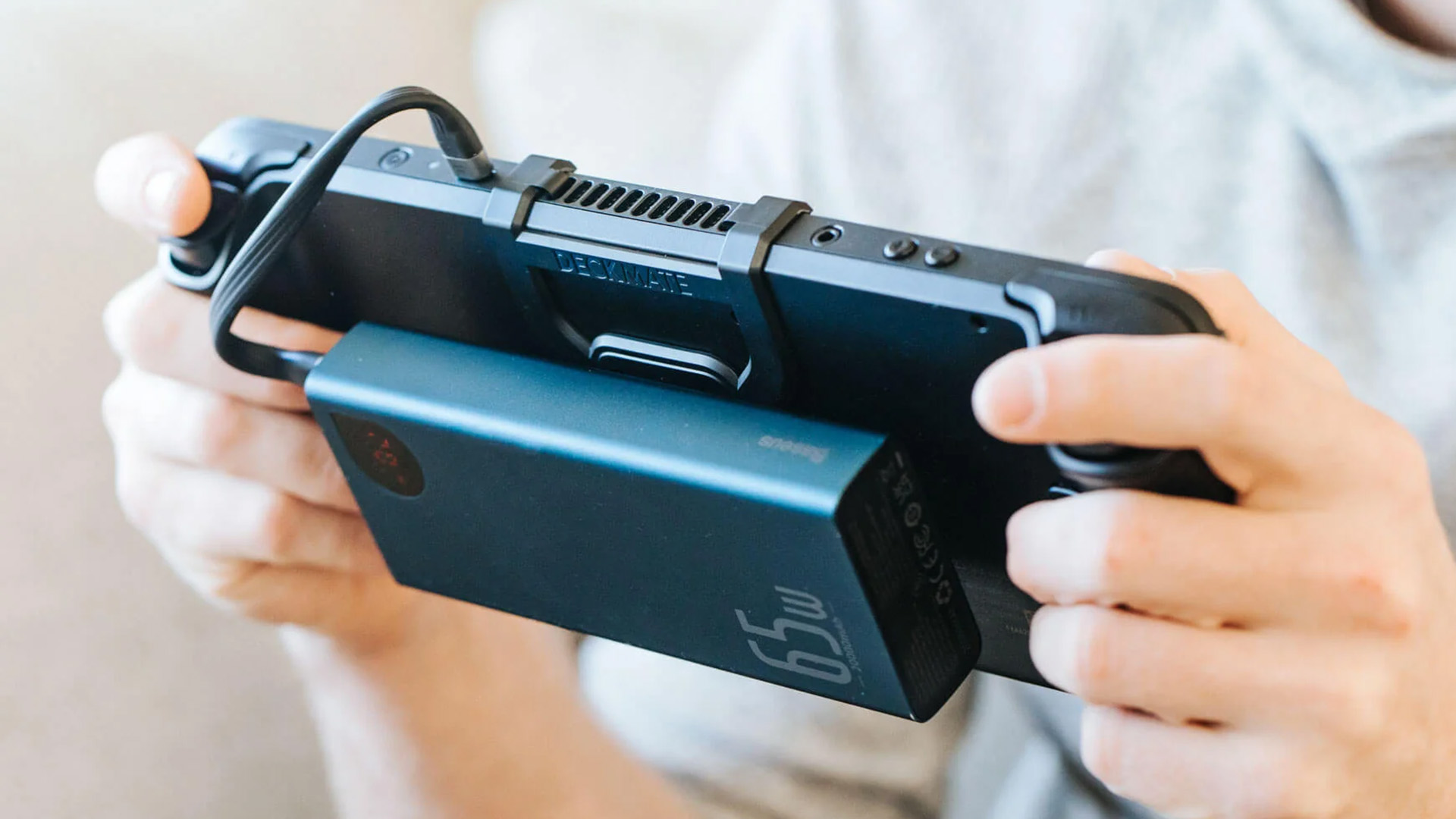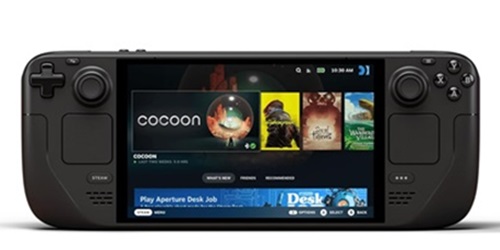Valve confirms the Steam Deck won't have annual releases — Steam Deck 2 on hold until a generational leap in compute performance takes place
The Steam Deck 2 might be significantly faster than its predecessor.

Get Tom's Hardware's best news and in-depth reviews, straight to your inbox.
You are now subscribed
Your newsletter sign-up was successful
The Steam Deck ushered in a new gaming era, where you can enjoy AAA titles while lounging in your bed using a handheld device. It is no secret that gamers and enthusiasts alike are eagerly anticipating a potential Steam Deck 2 with massive improvements in the APU industry over the past five or so years. However, Valve has clarified that the Steam Deck 2 will likely not be hitting shelves anytime soon until a "generational leap in compute" takes place, as reported in an interview with Reviews.org.
The RDNA architecture from AMD was leagues ahead of its Vega offerings in terms of performance and driver support. With just the second iteration, RDNA 2, Valve in partnership with AMD designed a custom chip for the Steam Deck codenamed Van Gogh.
The Steam Deck's APU featured four Zen 2 cores and an eight Compute Unit-based RDNA 2 iGPU, with both architectures dating back to at least 2020. Even with the OLED refresh last year, performance improvements were notable for their absence.

AMD's latest Strix Point APUs (Ryzen AI 300) are based on Zen 5 and RDNA 3.5, and likewise when hit up with the question of a potential successor, Steam Deck designer Lawrence Yang replied, "It is important to us, and we’ve tried to be really clear, we are not doing the yearly cadence.”
It appears that Valve is taking an approach similar to Nintendo, Sony, and Microsoft. Even the newest PS5 Pro is still based on the old Zen 2 architecture. While improvements have been made in the handheld industry, with Intel also joining the battle with its Lunar Lake (Core Ultra 200V) CPUs, they are not significant enough to justify a Steam Deck 2, at least yet. "So we really do want to wait for a generational leap in compute without sacrificing battery life before we ship the real second generation of Steam Deck," explained Yang.
On the more technical side, APUs nowadays are hardly faster at sub-15W levels than they were with Rembrandt (Ryzen 6000 Mobile). Lunar Lake is a step in the right direction due to its design choices but if even that is insignificant for Valve, then the Steam Deck 2 may be a large jump in performance and battery life. Valve is also working on an ARM64 version of Proton, so using Arm cores alongside a GPU solution from Intel/AMD/NVIDIA is also a possibility like the Nintendo Switch.
Get Tom's Hardware's best news and in-depth reviews, straight to your inbox.

Hassam Nasir is a die-hard hardware enthusiast with years of experience as a tech editor and writer, focusing on detailed CPU comparisons and general hardware news. When he’s not working, you’ll find him bending tubes for his ever-evolving custom water-loop gaming rig or benchmarking the latest CPUs and GPUs just for fun.
-
hotaru251 ngl I wish everyone had this mentality.Reply
there doesnt need to be a sequel until its a noticeable improvement. -
Pierce2623 I just want the ARM version of Proton. X86 handhelds still suck because of how bulky they are. I mean, don’t get me wrong, I’ve got a Steam Deck. It just sucks.Reply -
doughillman ReplyPierce2623 said:I just want the ARM version of Proton. X86 handhelds still suck because of how bulky they are. I mean, don’t get me wrong, I’ve got a Steam Deck. It just sucks.
:rolleyes: 🤡 -
Notton Steamdeck (LCD) launched on Feb 22', so 2yrs have passed.Reply
The APU used was Zen2 + RDNA2, so there's been substantial improvements there too.
But I can totally understand waiting for a cheaper variant of Zen5 + RDNA3.5, or the Z2 chip, to ship. -
Pierce2623 Reply
The clown emoji is only suitable for those that have convinced themselves x86 handhelds are already good. I’ve got a Deck and a Ally both just collecting dust.doughillman said::rolleyes: 🤡 -
Giroro FINALLY! Valve finally had the courage to confirm the Steam deck didn't get an annual update when it was a year old ... 2 years ago.Reply -
thestryker Nothing off the shelf can compete, but Van Gogh wasn't off the shelf either. I have a hard time believing something based on Zen 4c/5c with RDNA 3.5 wouldn't be a lot higher performance especially if they added on some cache for the GPU. Power consumption for quad channel might be too high, but that would be another potential lever. Whether there's a new Steam Deck or not next year ought to be interesting for handhelds with Lunar Lake and Zen 5 based devices.Reply -
Giroro Really though, I don't care too much if Valve makes the Steam Deck more powerful, but I very much would like it to be smaller.Reply -
palladin9479 Hmm we had this debate already, ISA only really matters at super low power. Well more like sub 500mhz or so. When we approach 1ghz (one billion operations per second) every scalar processor hits the same I/O issues and requires the same solutions. Those solutions are complex and erase all ISA distinctions.Reply -
cryoburner Reply
While they might not 'need' to frequently release significantly improved versions of the hardware, unlike with locked-down console ecosystems, any company can release their own competing PC handheld. So after a few years, the hardware is inevitably going to start looking a bit dated compared to newer products from competitors. Unlike with the Nintendo Switch, they can't go anywhere close to 8 years before a successor to the Steam Deck is released. Though, technically, I suppose Valve could just discontinue the product line and never release a successor like they have had a tendency of doing with all their other hardware. : Photaru251 said:ngl I wish everyone had this mentality.
there doesnt need to be a sequel until its a noticeable improvement.
There are some rumors about a potential Index 2 in the works, though unless they make the cost far more palatable, it's unlikely to do much to revitalize the stagnating PC VR ecosystem.
The problem with that idea is that the PC games you would be running on it are designed for x86, and would in many cases see a notable hit to performance with the code being translated to run on ARM architecture. On a higher-powered desktop or laptop you might have performance to spare to allow for that sort of emulation, but on a handheld you are already being limited by the hardware even for native code, so the hardware would need to be overbuilt to counteract the performance loss, and would see a reduction in efficiency as well, probably countering any potential gains that the alternate architecture might have to offer.Pierce2623 said:I just want the ARM version of Proton. X86 handhelds still suck because of how bulky they are. I mean, don’t get me wrong, I’ve got a Steam Deck. It just sucks.